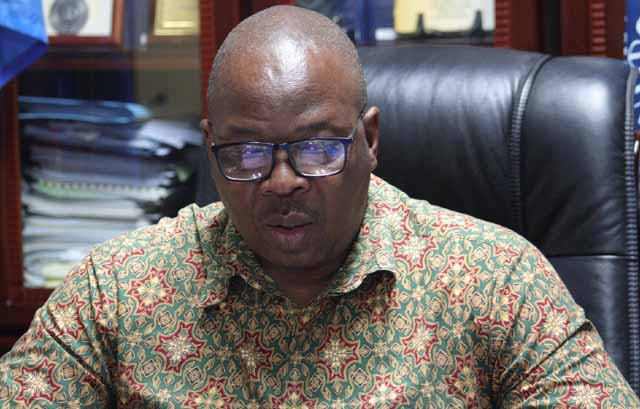By SIFISO NHLABATSI | 2024-12-21

EswatiniBank has taken Swazi Med to court following what it terms a threat to terminate membership of the bank’s 130 employees.
In an urgent application moved before court yesterday, the bank represented by Zweli Jele of Robinson Bertram law firm sought an order reviewing and setting aside Swazi Med’s decision to prohibit a select group of its employees to exercise their constitutional right to terminate their membership on the basis that it is anti-competitive, irrational, invalid and unlawful.
According to the court documents, 171 of the bank’s employees have terminated their membership with SwaziMed while 130 opted to remain, but the medical aid scheme allegedly wants to terminate membership of all the bank’s employees.
The migration by the 171 employees as per the notice dated September 26, according to the bank would take place on January 1.
EswatiniBank Managing Director, Nozizwe Mulela, said there is a real fear on the part of the bank that the migration by the 171 employees will result in Swazi Med terminating the membership of the remaining 130 members.
“The interim interdict sought by the applicant is aimed at preventing the respondent from terminating or suspending the membership of the remaining 130, which are those who have exercised an election to stay,” submits the MD.
Mulela further submitted that given that the migration by the 171 employees is now imminent and SwaziMed intransigence and premised on the events that transpired between November 1, and 4, there was a reasonable fear that the respondent would respond to the migration by terminating the membership of the remaining employees.
“The harm that the bank reasonably apprehends will occur if the respondent terminate or suspends the membership of the 130 employees as punishment for the fact that their colleagues have exercised their right to choose an alternative medical aid fund, will have occurred if the application were to be brought in the normal course,” Mulela submitted.
She said the nature of the harm, was that the employees who have exercised their right to remain as members of the respondent, maybe without any medical aid cover, and thus unable to obtain critical medical services.
She said as an employer, the bank would be prejudiced as it would not be able to fulfil its contractual obligation to its employees as medical aid is a condition of employment.
The matter is before Judge Justice Mavuso and it will be back in court for arguments on December 27.
Mulela prayed for the court to declare Swazi Med’s decision to prohibit split membership, predicated on its restrictive solidarity policy which refuses to allow its members to terminate their membership and join a medical aid of their choice unless all employees of the applicant follow suit to be irrational, invalid and unlawful.
In her founding affidavit, she stated that she has been directly involved on the bank’s behalf in engagements with Swazi Med pertaining the issue.
She stated that the 130 employees had exercised their election to remain as members of Swazi Med medical aid scheme.
“The decision taken by the respondent to decline to keep those employees who wish to exercise their right to retain their membership of Swazi Med on account of the fact that other employees have elected to terminate their membership is anti-competitive, designed to unfairly promote exclusivity to the prejudice of the remaining members,” the managing director stated.
According to the managing director, Swazi Med's position is that the medical aid scheme is offered on condition that the bank as employer will undertake to exclusively use their services with a result that the employees are deprived their right to choose a medical aid scheme of choice even though Swazi Med was not meeting their needs.
She said the alternative of course was that the bank was free to move all of its employees to another scheme even though some of its employees are content to remain with Swazi Med.
“As a consequence of this policy, there has been a serious decline in the levels of efficiency, integrity and competitiveness on the part of Swazi Med.
It has been content in using its dominant and historical position of being the first and the largest medical aid institution to prevent employee members from exercising their right to choose a suitable medical aid service provider,” Mulela submitted.
She went on to inform the court that on November 1 Swazi Med unilaterally terminated membership of all the bank’s employees. She stated that this was done in the most oppressive and prejudicial manner. She said the membership was restored after engagements with SwaziMed.
The managing director stated that as a bank they were aware that there were other institutions with split membership in terms of Swazi Med and other medical aid service providers.
She listed some of the entities as
n FSRA
n MTN
n Limkokwing University
n ENPF
n SNG Grant Thornton
n SUFIAW
n Select Limited
n ENPC.
Employees concerned with SwaziMed service – Bank
Some of the reasons for employees to migrate to other schemes according to the papers filed by EswatiniBank is that there is growing consternation by some of the employees pertaining to the service, affordability, availability of certain products at Swazi Med.
The bank stated that healthcare in general has been fraught with rising costs, which have necessitated that people shop around for the most affordable medical aid scheme that is suitable for their individual needs.
Managing Director, Nozizwe Mulela, submitted that healthcare is not homogeneous,requiring medical aid scheme members to look for schemes that can best serve their health requirements.
“The various medical aid schemes have their unique baskets of services, whereby you find that one medical aid scheme caters for certain medical services whereas another does not. Premised on individual conditions, there is an inclination to join a medical aid scheme that best serves unique individual purposes,” the managing director stated.
Customers
She went on to explain that efficiencies and customer service are also an important ingredient in terms of selecting the most appropriate medical aid scheme.
She said it was fair to say that there were also those employees who were content with the service provided by the respondent.
“Employees have expressed concern at the lack of service delivery by the respondent as well as the unavailability of certain products which are available with some of the new entrants whilst exercising their right to select products that are at fair value and should not be forced to enter into agreements against their will,” Mulela stated.
She submitted that some employees had argued that they had a right to migrate to a medical aid that will best serve their medical needs as opposed to being stuck with one whose service and terms are clearly prejudicial to them and are not in their best interest.
“As a consequence of this divergence of opinion, the bank undertook a survey among its employees and established that at least 43 per cent were content with remaining with SwaziMed while the balance of 57 per cent were instigating for the right to migrate to their preferred medical aid scheme,” the managing director stated.
She went on to state that this is not a new debate at the bank's undertaking as in 2019, a similar debate arose and there were engagements with Swazi Med, which ended in a deadlock.
Some of the other reasons for migration
n The failure by Swazi Med to pay medical bills issued by doctors or health institutions on time or at all with a result that medical service providers such as hospitals, clinics and doctors pursuing the individual employees for payment.
n The failure by the scheme to cover certain specialist treatment, even though at times prior to the procedure, they had agreed to cover such.
n The failure to ensure that Swazi Med’s medical cover is acknowledged and accepted by most medical institutions, particularly those in the Republic of South Africa.
nThe inability of the respondent to cover certain illnesses and medical procedures.
n Various medical aid schemes have their unique idiosyncrasies, some of which appealed to some employees.
Public healthcare is over
burdened – EswatiniBank MD
The Managing Director, Nozizwe Mulela, has argued that the public healthcare system in the country is by and large overburdened, underfunded and suffers from serious degeneration.
She submitted that the resultant effect was that a good percentage of the population has now had to resort to private medical healthcare for adequate medical care.
“In an effort to improve our employees wellbeing and in order to ensure that our employees have access to the private medical healthcare, we made it mandatory for the employees to join a medical aid fund as part of their terms and conditions of employment,” she submitted.
According to the managing director, for a considerable period, Swazi Med was the only medical aid fund in the country and as a result, it easily became the largest and most dominant medical aid scheme.
She submitted that during this period of exclusivity, the bank entered into an agreement with Swazi Med in terms of which employees of the bank compulsorily became members of the respondent.
Mulela explained that the nature of the agreement was that the bank became an employer member shareholder by virtue of having at the time more than 200 employees who subscribed to be members of the respondent's medical aid fund.
“The bank is the liaison on administrative matters between its employees who are members of the medical aid scheme and Swazi Med,” Mulela further submitted.
She stated that as a bank they participate in the medical aid fund as an employer.
In terms of the respondent's Swaziland Medical Aid Fund Rules (adopted with effect from January 1997), the bank is classified as an ‘employer’.
She explained that Rule 6 (1) provides: ‘the board may, in its entire discretion, on application by any company admit such company as an employer and extending participation in the Fund to the employees of such company on the same terms and conditions as apply to the employees of existing employers participating in the Fund’.
She asserted that with the admission of new entrants in the medical aid scheme industry in the country, there has been a growing desire on the part of employees to join other schemes as opposed to Swazi Med.
Eswatini Competition Commission investigations cited
One of the issues which was raised by the bank was the investigation instituted by the Eswatini Competition Commission against Swazi Med.
EswatiniBank MD Nozizwe Mulela said she was aware that the Eswatini Competition Commission has instituted an investigation in terms of Regulation 12 (3) of the Competition Commission Regulations against the scheme and the bank will also follow that investigation.
“In terms of this notice, the Commission is investigating the respondent with respect to what is termed engaging in ‘prohibited trade practices’. A copy of the public notice that was issued by the Competition Commission is annexed,” Mulela stated.
Adding she said, the scheme’s discriminatory practice was unfair and unconscionable.
“Whereas the Swazi Med has no qualms in allowing other employers to have split membership, it has for inexplicable reasons maintained a belligerent stance with respect to the bank.” According to the MD, the unfair treatment cannot be countenanced.
She submitted that the mere fact that there was a considerable number of employers that were already enjoying the benefit of split membership, had placed the bank in an invidious position when seeking to justify the prohibition.
She submitted that as an employer that is subject to the same terms and conditions of the other participating employees, Swazi Med has no right to discriminate the bank. “Such discrimination is unlawful,” she stated.
share story
Post Your Comments Below

HISTORY was made yesterday at the Royal Villas in Ezulwini as the AGIC Global Foundation and Eswa...
SOCCER - CAPITAL city side Mbabane Swallows Goalkeeper Bongiswa ‘Romario’ Dlamini say...

NATIONAL Commissioner of Police, Manoma Vusi Masango, has urged liquor outlet operato...

The Kingdom’s leather industry is poised for significant growth as it embarks on a 17-day p...
All material © Swazi Observer. Material may not be published or reproduced in any form without prior written permission.
Design by Real Image Internet